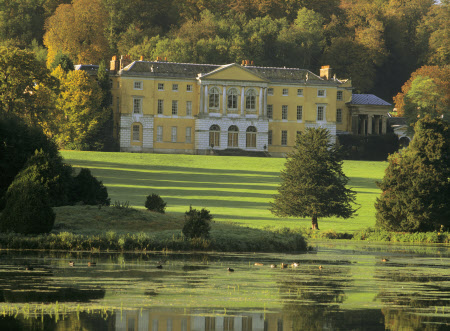In October 1772, Baron le Despencer hosted Benjamin Franklin at his estate at West Wycombe, Buckinghamshire (shown here). At the time, Franklin’s London landlady was moving house, so he got to stay away from that “troublesome Affair.”
Franklin wrote to his son William, “I spent 16 Days at Lord Le Despencer’s most agreably, and return’d in good Health and Spirits.” To John Foxcroft, his fellow deputy postmaster general for the colonies, Franklin reported: “I spent a Fortnight lately at West Wyecomb, with our good Master Lord Le Despencer, and left him well.”
Although Franklin referred to the postmaster general as “our good Master,” the light-hearted tone of that reference seems very different from the way Foxcroft had written about “the Displeasure of our Honored Masters” when he worried his job was in jeopardy.
Either then or soon afterward, Despencer invited Franklin to work with him on editing down the Anglican Church’s Book of Common Prayer. The baron wrote on his manuscript: “Doctor Franklyn is desired to add, alter, or diminish as he shall think proper anything herein contained. L[ord] L[e] D[espencer] is by no means tenacious.”
Early in the summer of 1773, the baron invited Franklin to visit his home again and accompany him to see Lord North installed as the new chancellor at Oxford. The two men stayed in adjoining chambers at Queen’s College. The American told his son, “Lord Le Despencer…is on all occasions very good to me, and seems of late very desirous of my Company.”
Franklin closed that letter by saying he would “allow my self no more Country Pleasure this Summer.” But in August he visited West Wycombe again—“quite a Paradise,” as he called the estate. And he was back again in late September.
By that time Franklin clearly returned the baron’s admiration, writing:
I am in this House as much at my Ease as if it was my own, and the Gardens are a Paradise. But a pleasanter Thing is the kind Countenance, the facetious and very Intelligent Conversation of mine Host, who having been for many Years engaged in publick Affairs, seen all Parts of Europe, and kept the best Company in the World is himself the best existing.All those remarks show that by 1773 Franklin and Despencer had developed a real friendship; they were no longer just a noble supervisor and his colonial deputy.
That change is also evident in the way Franklin wrote to the baron. Yesterday I quoted a letter from 1770. By April 1774, Franklin started another letter “My dear Lord” instead of “My Lord,” and closed with “With unalterable Attachment” instead of “with the greatest Respect.” (In return, Despencer addressed his sole surviving letter to Franklin “Dear Doctor.”)
In early 1774 Lord North’s government stripped Franklin of his postal service appointment and income, but that didn’t end Despencer’s affection. The two men even attended a public event in London together.
After Franklin sailed for Pennsylvania, now at war with the British government, the baron told Foxcroft, “Whenever you write to Dr. Franklin assure him of my Sincere good will and Esteem. I fear much I shall not see him here so soon as he assured me I should.” Meanwhile, the doctor had sent his own friendly letter with good wishes for Despencer—and his mistress and their children.
That takes me back to the question I started this month with: What evidence is there linking Franklin with the “Monks of Medmenham Abbey” club that Baron le Despencer had started in the 1750s when he was Sir Francis Dashwood, baronet?
As I view the surviving documentary record, there are no recorded links between Franklin and Dashwood in the 1750s and early 1760s, when that club was active. The baron became the American’s superior in the postal service in 1767, but the two men remained on formal terms until 1770. I can’t see Dashwood/Despencer inviting Franklin into his secret activities during those years.
By 1773, however, that situation had changed. Franklin and Despencer admired each other, enjoyed each other’s company, exchanged potentially sensitive ideas about imperial politics and religion, and remained friends despite being separated by politics and war until the baron died in 1781.

No comments:
Post a Comment